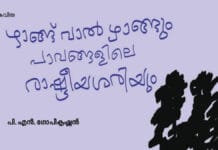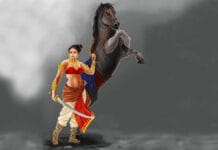A region is generally understood as a specific geographical area that can be identified in terms of its geography, history, language, and politics. Not all regions necessarily share the same religion, rituals, or customs, but there is usually a unifying element that connects them. In Kerala, Malayalam language serves as the strongest binding force among the people, despite the existence of numerous dialects and linguistic variations. Malayalam acts as the dominant language that connects even the most isolated linguistic communities, including the forest dwellers. Therefore, Kerala can be described as a politically formed and linguistically unified state, defined by its common language and collective identity.
- A region is a space that can be understood through its geography, history, language, and politics.
- Not all regions share the same culture, religion, or customs.
- Language plays a vital role in defining a region — even if dialects differ, there is usually one dominant language.
- In Kerala’s case, Malayalam is that unifying language, linking all its dialects and communities, including those in forest areas.
- Therefore, Kerala is described as a politically formed linguistic state — a territory defined by its language and governance.
Geography and the Name ‘Kerala’
Geographically, Kerala is characterised by a diverse natural landscape that includes forested hills, fertile plains, tranquil backwaters, and an extended coastal belt along the Arabian Sea. Historically and linguistically, this region was referred to by names such as Malayalam and Cheralam. The term Malayalam literally means “the land between the hills (mala) and the sea (alam)”, whereas Cheralam means “the land that merges with the sea,” derived from cher (merge) and alam (sea). Over time, Cheralam evolved into Keralam, the name we use today.
There is a popular but mistaken belief that the name Kerala comes from the Sanskrit word nalikera, meaning “coconut.” In reality, coconut cultivation became widespread in Kerala only about 700 years ago. The historical records, however, show that the name Kerala existed much earlier—it appears in the Asokan edicts of the 3rd century BCE, proving that the region’s identity is much older than its association with the coconut tree. The Dravidian term for coconut, tenkai (meaning “fruit of the south”), later became thenga in Malayalam. Therefore, all other explanations linking Kerala’s name to the coconut are linguistically unfounded.
- Kerala has a distinct physical geography: forested hills, plains, rivers, backwaters, and a long coastline.
- Historically, the area was known as:
- Malayalam — from mala (hill) + alam (sea): land between the hills and the sea.
- Cheralam — from cher (merge) + alam (sea): land merging with the sea.
- The modern word Keralam is derived from Cheralam.
- A common but incorrect belief is that Kerala comes from the Sanskrit nalikera (coconut).
- Coconut became a widespread crop only about 700 years ago.
- The name Kerala actually appears in Asokan inscriptions (3rd century BCE), proving its ancient origin.
- The Dravidian word for coconut is tenkai (fruit of the south), from which thenga in Malayalam evolved.
Kerala’s Cultural and Knowledge Links
Kerala has never been an isolated or inward-looking region. It has always maintained cultural, commercial, and intellectual connections with other parts of India and the world. The state’s position along the coast made it a major centre for trade and cultural exchange since ancient times. Because of these interactions, Kerala’s body of knowledge and culture cannot be claimed as entirely original or purely local. Knowledge in any region, including Kerala, has evolved through a long process of exchange and adaptation. Different societies and cultures have always shared and borrowed ideas, tools, and technologies from one another. Consequently, every form of knowledge is composite, meaning that it is built through the combination of contributions from multiple sources.
- Kerala has never been isolated; it has always interacted with other cultures through trade, migration, and the exchange of ideas.
- Knowledge is never purely local — it is shared, borrowed, and adapted through contact with others.
- Every form of knowledge is composite — built from multiple sources, both native and foreign.
- This openness has made Kerala’s intellectual and cultural systems diverse and dynamic.
Adaptation and Diversity
The people of Kerala have continuously adapted to their geographically varied environment. Over centuries, they developed and modified various technologies, practices, and systems of knowledge to survive in landscapes ranging from dense forests and mountains to coastal plains. These adaptations were crucial for their daily survival and livelihood. As a result, the people’s living conditions, social institutions, and cultural practices have always been diverse and unequal in terms of development. The evolution of Kerala’s society thus reflects an ongoing relationship between humans and their environment.
- People in Kerala have long adapted to its diverse landscapes — from hills to coasts.
- Over centuries, they developed different forms of technology and knowledge suited to survival in each ecosystem.
- Their institutions, lifestyles, and ideas evolved differently in each region, leading to uneven but rich development.
To study Kerala’s people and their systems of knowledge, it is essential to understand how different human groups are categorised.
Ethnic Groups
An ethnic group refers to a collection of people who share a common historical background, cultural practices, physical features, and a sense of identity. Such groups often have their own traditions, languages, and social structures. However, these characteristics are not static. They can change over time due to processes like education, acculturation, and assimilation—in other words, through exposure to new ideas, interactions with other groups, and adaptation to changing circumstances. In the context of Kerala, this definition helps us understand how different communities, especially those living in forest and hill regions, have passed on traditional knowledge orally across generations.
The use of the word “tribe” is avoided because it implies a group that is entirely isolated and exclusive. In Kerala, most of these groups are only partially isolated and have gradually become part of the broader society. Therefore, the more inclusive and flexible term “ethnic group” is preferred to describe them.
- Ethnic groups are people who share:
- Common history, language, culture, and physical traits.
- These features can change over time through education, acculturation (adapting to new influences), and assimilation (blending into a larger society).
- This definition is used here to describe communities that preserve oral traditions, especially those in forests and forest edges.
- The term “tribe” is avoided because:
- Tribal life is more exclusive and isolated,
- Whereas ethnic groups are more inclusive and connected to the broader society.
- Ethnic groups are people who share:
Community
The term community in anthropology refers to a group of people who share a common cultural identity and a sense of belonging. Communities are defined by their shared customs, values, practices, and collective memory. They often adapt to new economic or material conditions as society changes, yet they continue to view their transformed lifestyles as extensions of their original traditions. In a more general sense, the word “community” may refer to people who are connected by their place of residence, profession, institution, or other shared interests. In this textbook, the term is used in both senses—anthropological and general—to describe groups bound by culture or locality.
- In anthropology, a community means:
- A group of local people with shared culture, customs, values, and identity.
- Communities change as material conditions change (for example, through new technology or the economy).
- Yet, they see their new way of life as part of their tradition, showing cultural continuity.
- In a general sense, a community can mean people connected by:
- Locality, residence, profession, or institution.
- In anthropology, a community means:
Caste
The word caste refers to endogamous social groups, meaning groups in which marriage takes place within the same community. These groups, originally known as jatis, were closely linked to specific hereditary occupations. The caste system thus organised society into various occupation-based groups, each with its own social status and traditional role.
- The word caste refers to endogamous groups (people who marry within their group).
- Traditionally, these were called jatis,
- Each linked to a hereditary occupation.
- This system structured much of Kerala’s historical society and division of labour.
Kerala is best understood as a linguistic, geographical, and historical region that has developed through centuries of cultural contact and environmental adaptation. Malayalam language binds its people together, while the state’s geography—from hills to coasts—has shaped its social and economic diversity. The name Kerala has ancient origins, dating back to early historical records, and its identity has always been dynamic and outward-looking.
The people of Kerala are grouped into various ethnic and social categories, each with unique traditions and lifestyles. Communities have evolved, blending old practices with new conditions while preserving their cultural identity. The caste system, based on endogamous occupations, also played an essential role in shaping Kerala’s social order. Altogether, Kerala’s society and its knowledge systems illustrate how people, environment, and culture have interacted over centuries to create a rich and varied regional identity.
- Kerala is a linguistic and cultural region defined mainly by Malayalam language and a diverse geographical landscape.
- The name Kerala has ancient origins, unrelated to coconut.
- The region’s knowledge and traditions have developed through interaction with other cultures rather than isolation.
- Its people are diverse in ethnicity and community, but connected through shared values and adaptation to the land.
- Terms like ethnic group, community, and caste describe different ways people organise themselves socially and culturally in Kerala.



























